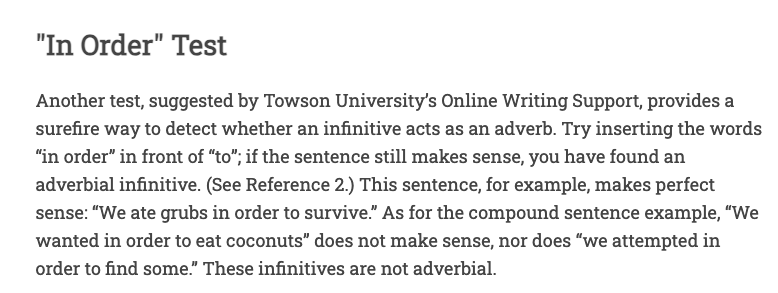
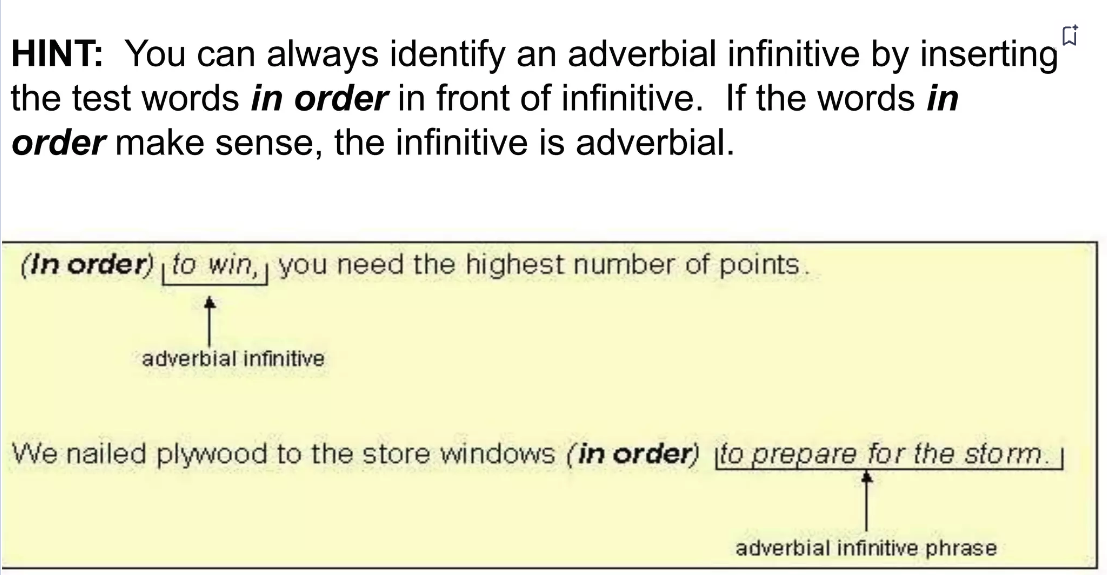
lessons I’ve learned from my past


ref – https://www.englishwithashish.com/adjective-complement-masterclass
An adjective complement is a phrase or a clause that completes the meaning of an adjective by giving more information about it.
note:
phrase – A phrase is a group of words that stand together as a single grammatical unit
clause – subj and verb
When we add ‘ed’ to certain verbs, it can be used as an adjective.
It is an emotion or a feeling that the subject is experiencing.
In other words, it is how the subject feels:
ref – https://www.youtube.com/watch?v=Iav1b6LkD7Q
ref –
to have is the infinitive
You seem [to have] forgotten your jacket.
I was happy [to have] finished everything early.
You seem [to have] eaten your dinner already.
I am glad [to have] said yes to your offer.
We feel ashamed [to have] lost to the kid.
Receive the action
They expect [to be] invited.
We waited [to be] given instructions.
Prepare [to be] amazed!
Receive the action
I’m happy [to have been] invited.
It was an honor [to have been] chosen.
– Spend at least fifteen minutes and read the book three times carefully.
– If you have vocabulary words, look it up, write its definition, word type, and create three sentences.
In our example, we will use the short story “Pirate Pat”.
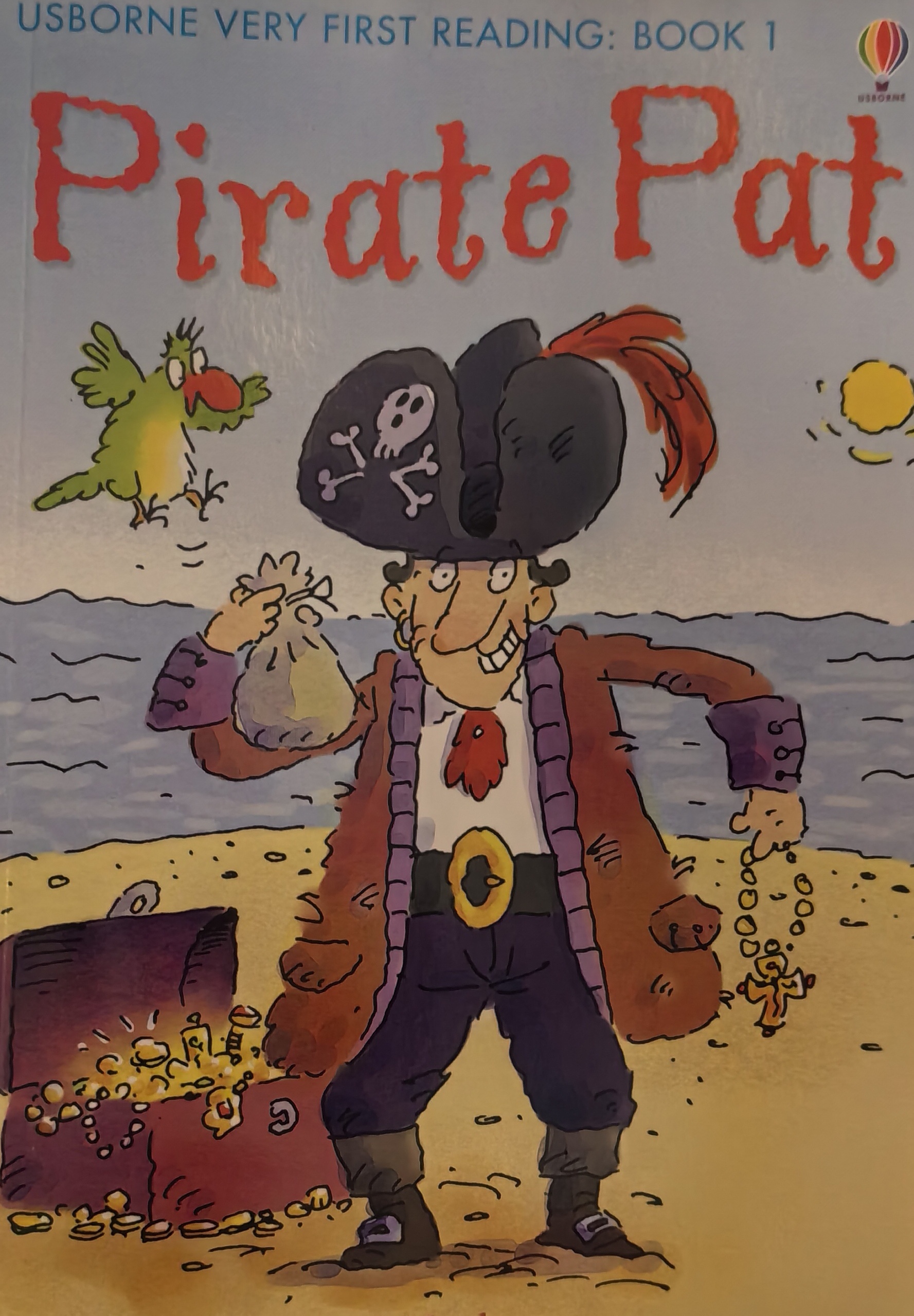
Let’s just use the short story’s main idea as our thesis.
For example, in Pirate Pat, a thesis statement would be:
Pirate Pat has found treasure at Gran’s house because he has a treasure map and wants to dig it up.
Now we write a simple hook to capture the reader’s attention:
A scary pirate appears at the front door.
Now connect the thesis and introduction with a bridge:
A scary pirate appears at the front door. [hook]
Gran and the kids are scared. [bridge]
Pirate Pat has found treasure at Gran’s house because he has a treasure map and wants to dig it up. [thesis]
re-iterate part of the thesis
[Point] Pirate Pat has a treasure map.
Grab a quote that supports your point.
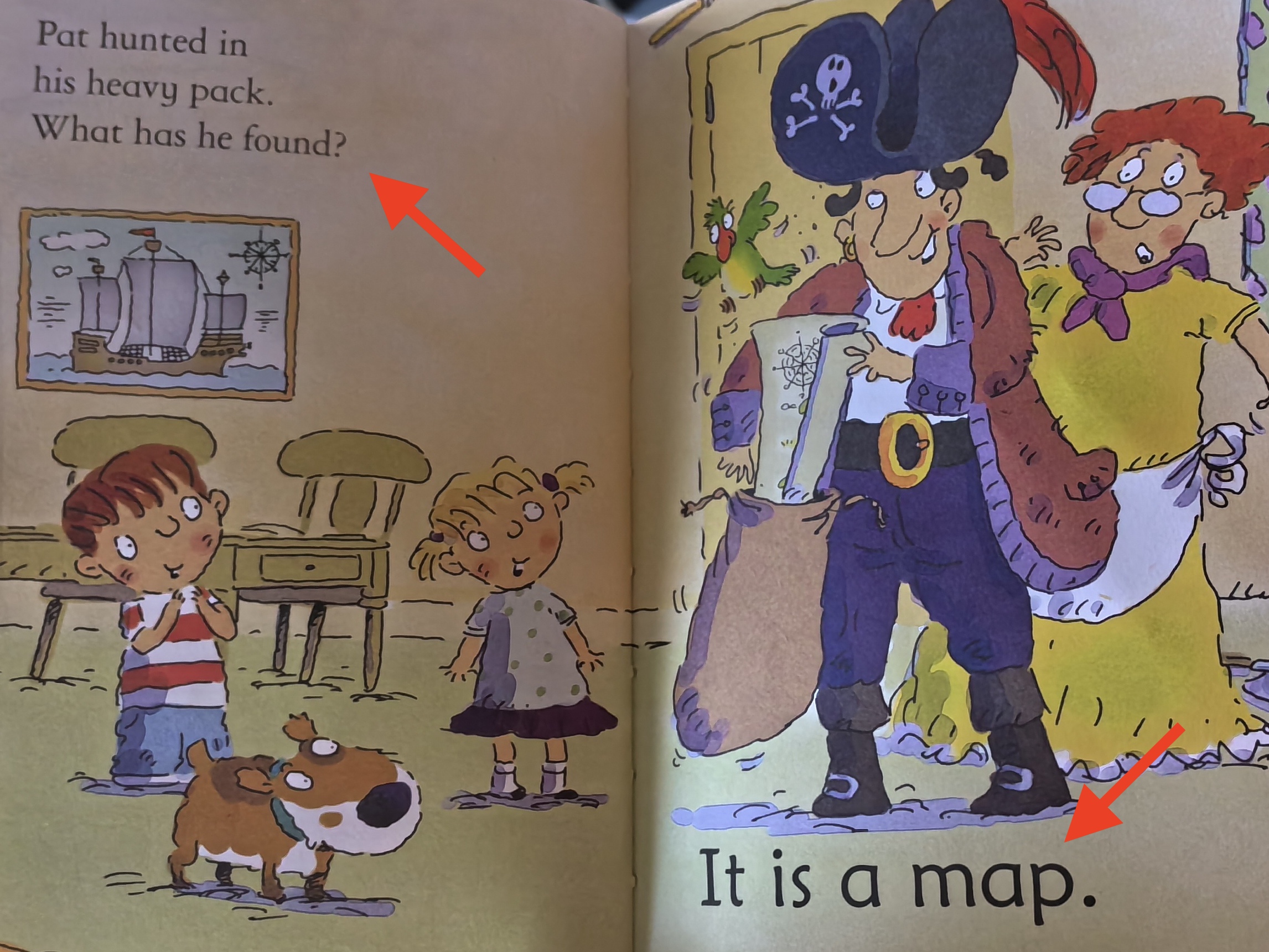
[Evidence] “Pat hunted in his heavy pack. What has he found? It is a map.”
[Explanation] On a dark cold day, he uses the map and arrives at Gran’s house. Gran lives in a cozy house with two grandkids. Gran and her kids are scared of the pirate, but watches him. He shows them the map to explain that he is there because he wants to find treasure. He is not scary at all.
re-iterate part of the thesis
[Point] Pat shows Gran the map and says he wants to dig at the house.
Grab a quote that supports the point
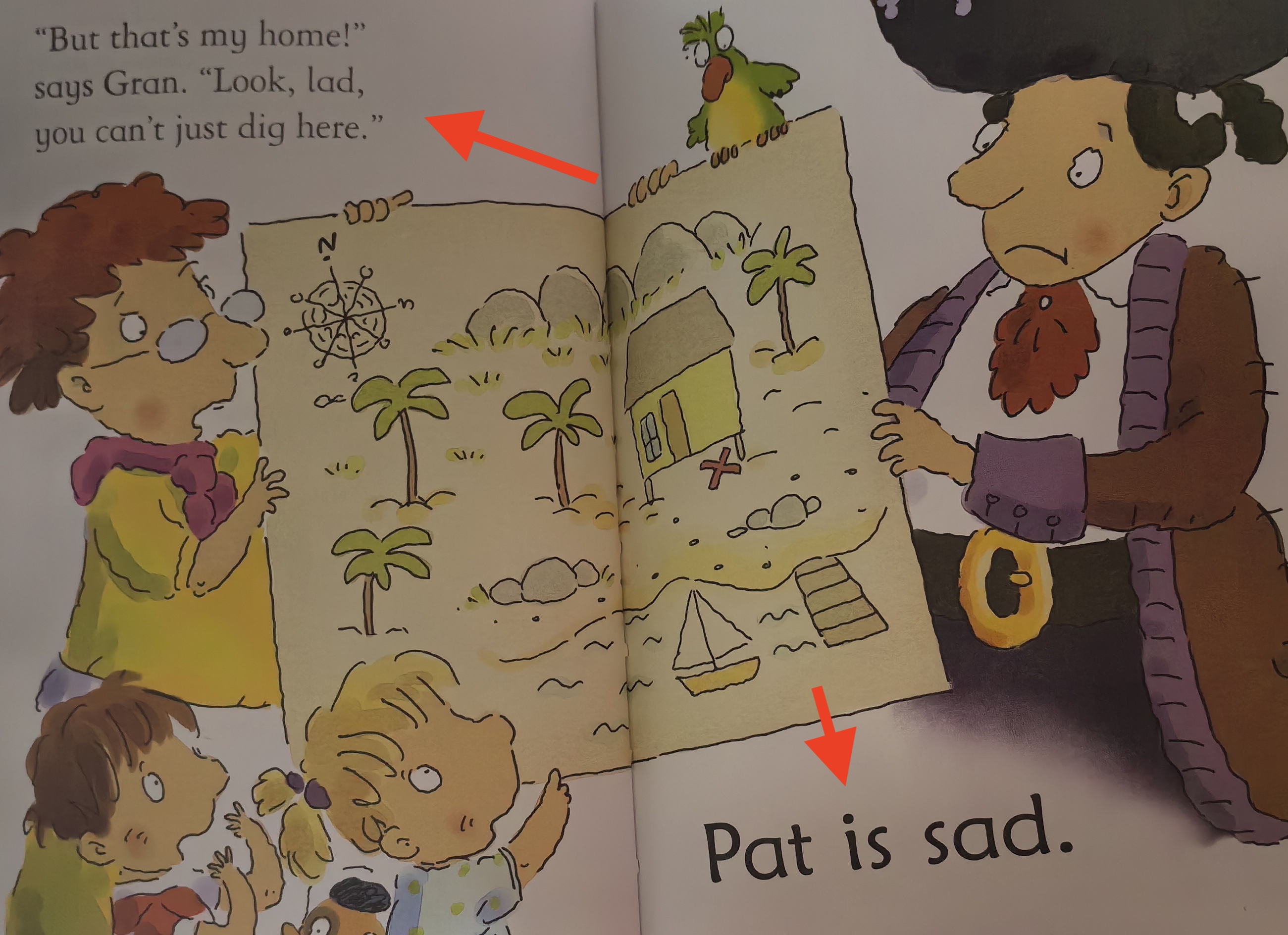
[Evidence] “But that’s my home!” says Gran. “Look, lad, you can’t just dig here.”
“Pat is Sad”
[Explanation] Gran tells Pat he can’t dig there because it is her house. Because of this, he is let down and becomes depressed. But pat is stubborn and digs anyways. And in a stroke of luck, he manages to find the treasure!
In conclusion, Gran’s house is sitting on the treasure that’s on Pat’s map.
She doesn’t let him dig because it will ruin the house.
He does not listen, and finds the treasure.
His map was right. Pirate Pat was right. He finds the treasure after all.
The fearful kids and Pat celebrates with Pat.
A scary pirate appears at the front door. Gran and the kids are scared. Pirate Pat has found treasure at Gran’s house because he has a treasure map and wants to dig it up.
Pirate Pat has a treasure map. “Pat hunted in his heavy pack. What has he found? It is a map.” On a dark cold day, he uses the map and arrives at Gran’s house. Gran lives in a cozy house with two grandkids. Gran and her kids are scared of the pirate, but watches him. He shows them the map to explain that he is there because he wants to find treasure. He is not scary at all.
Pat shows Gran the map and says he wants to dig at the house. “But that’s my home!” says Gran. “Look, lad, you can’t just dig here.” “Pat is Sad”. Gran tells Pat he can’t dig there because it is her house. Because of this, he is let down and becomes depressed. But pat is stubborn and digs anyways. And in a stroke of luck, he manages to find the treasure!
In conclusion, Gran’s house is sitting on the treasure that’s on Pat’s map.
She doesn’t let him dig because it will ruin the house.
He does not listen, and finds the treasure.
His map was right. Pirate Pat was right. He finds the treasure after all.
The fearful kids and Pat celebrates with Pat.
test
haha
test2
The mother’s anxious face twisted into a knot. She quickly dialed nine one one. Soon, sirens could be heard and the red blue lights appeared from afar. Police veteran Peter Pecker squeezed out of his police car and waddled up the front porch like a fat pig. His trotters step on the porch. The poor mother opened the door and tearfully slid onto the ground.
Peter kneeled by the mother while she filed a police report on her son. He had been missing for three days. Peter’s eyebrows furrowed even closer when he saw that her son went missing near the library. This was the tenth report in the past week about kids disappearing near the vicinity of the library.
When Peter got back to the Police Stations, he assembled a squad of his best men and quickly drove like a race car driver to the library.He stepped on the gas pedal with all his power.The car lurched forward. Its wheels spun even faster and the car flew down the street.
It was half past midnight. The library was like a grave.The atmosphere was eerie and quite. And the men scoured the area like hunting dogs. They were sniffing and looking carefully over all the details. Suddenly, Peter saw what seemed like a backpack, similar to the one described by the mother. The men shined their flashlights and started to analyze it. However, no sign of life had been found. Paul, one of the veteran police officers, yawned and declared that it was half past midnight. It was a dead end and he suggested the men go home to get some rest. His wife has been ill for a while and he needed to get back to take care of her. Besides, they could always come back the next morning. The men agreed and retired home.
ref –
An intransitive verb is a verb that does not take a direct object.
In other words, the action of an intransitive verb is not done to someone or something.
It involves only the subject.
For example:
Sarah laughed.
(“Laughed” is an intransitive verb. The action of the verb only involves Sarah.)
The opposite of an intransitive verb is a transitive verb. A transitive verb can have a direct object.
Sarah ate an apple.
(“Ate” is a transitive verb. The action of the verb was done to something (“an apple”), which is the direct object.)
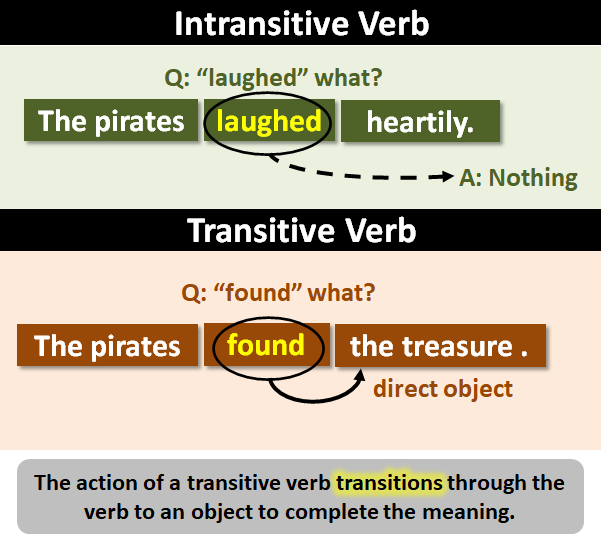
An intransitive verb does not take a direct object. Here’s a bit more on what that means:
He laughed.
(Laughed is an intransitive verb. It has no direct object. You cannot laugh something.)
He told a joke.
(Told is a transitive verb. The direct object is a joke. You can tell something. For example, you can tell a story, a lie, a joke, etc.)
You can find the direct object of a verb by reading the verb and then asking “what?” (or “whom?”).
If this question seems inappropriate, then you’re probably dealing with an intransitive verb. For example (verbs shaded):
He caught the bus after the party.
(Q: Caught what? A: the bus. This is a transitive verb. It has a direct object.)
He disappeared after the party.
(Q: Disappeared what? That doesn’t make sense. You can’t disappear something.
This is an intransitive verb. It can’t take a direct object.)
Here are some more examples of intransitive verbs. With each example, if you read the verb (shaded) aloud and ask “what?”, there will be no answer. There is no answer because there is no direct object. These verbs are all intransitive.
Every single person voted.
The jackdaws roost in these trees.
The crowd demonstrated outside the theatre.
(In this example, demonstrated is an intransitive verb. However, to demonstrate can be used transitively too, e.g., He demonstrated a karate chop to the class.)
Some verbs can be transitive and intransitive.
For example:
Mel walks for miles.
(As walks is not being done to anything, this verb is intransitive.)
However, compare it to this:
Mel walks the dog for miles
(This time, walks does have a direct object (the dog). Therefore, it is transitive. Some verbs can be both intransitive and transitive, depending on the usage.)
Here is another example:
The apes played in the woods.
(Played what? Nothing, intransitive)
The apes played hide and seek in the woods.
(transitive)
(Q: played what? A: hide and seek.)
While intransitive verbs are never followed by an object,
they can be followed by modifiers such as
that indicate where, when, or how something occurs.
Ravi jumped.
Leonardo is sleeping soundly.
Marie exercises as often as she can.
Lisa will meditate in the garden.
ref – https://www.grammar-monster.com/glossary/transitive_verbs.htm
A transitive verb is a verb that takes a direct object.
In other words, it is a verb that acts on something.
For example:
The dog ate the bone.
The verb “ate” is a transitive verb. It acts on “the bone,” which is the direct object of “ate.”
I am singing a song.
The verb “am singing” is a transitive verb. It acts on “a song,” which is the direct object of “am singing.”
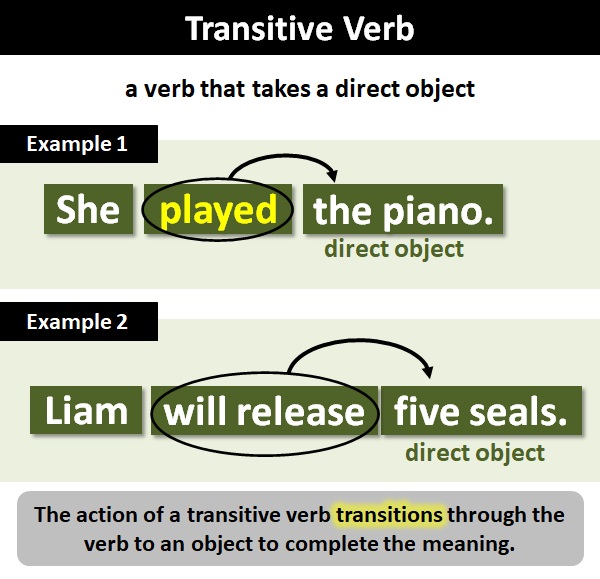
Lee eats pies.
(Eats is transitive because you can eat something.)
Lee loves mince pies.
(Loves is transitive because you can love something. Note that direct objects aren’t usually single words. They’re usually noun phrases, i.e., more than one word.)
Lee bought dozens of cakes.
(Bought is transitive because you can buy something.)
All the toys opened their eyes as the clock struck midnight.
(Q: Opened what? A: their eyes)
(Q: Struck what? A: midnight)
(If it answers the question “what?” or “whom?” in relation to a verb, then it’s a direct object. Midnight is a noun, it’s a perfectly good direct object for the verb to strike.)
No amount of time can erase the memory of a good cat, and no amount of masking tape can ever totally remove his fur from your couch.
You can’t get eight cats to pull a sled through snow.
I loathe people who keep dogs. They are cowards who haven’t got the guts to bite people themselves.
(Q: Loathe what? A: people who keep dogs)
(Q: Haven’t got what? A: the guts to bite people)
(If you look at just the two direct objects in this example (i.e., the texts in bold),
there’s a transitive verb in each one.
“people who keep dogs”
Q: Keep what? A: dogs
“the guts to bite people”
Q: To bite what? A: people)
A transitive verb gets its name from the idea that the action must transition through it to an object in order to complete the meaning.
Lee (subj) caught (verb). X(incomplete)
(When the action does not transition through the verb to an object, the meaning is incomplete.)
Lee (subj) caught (verb) a whelk (obj). √
She gave the waiter a smile.
(Here, a smile is the direct object (it answers “gave what?”), and the waiter is the indirect object (it answers “for whom?”).)
It doesn’t happen too often, but sometimes a transitive verb works with just an indirect object.
He paid her.
(This is a transitive verb without a direct object. The meaning is still complete because the action transitions through the verb to an indirect object.)
ref – https://www.grammar-monster.com/glossary/noun_phrases.htm
A noun phrase is a group of two or more words headed by a noun that includes modifiers.
note:
adjectives and adverbs are modifiers
Phrases can also be modifiers
the dog
the = modifier
a cat
a = modifier
a group of them
‘a’ and ‘of them’ = modifiers
The best car safety device
‘The best car safety’ = modifier
the man with her
‘the’ and ‘with her’ = modifiers
*highlighted is the head noun
People: the soldier, my cousin, dopey Alan, the lawyer with the big nose
Animals: that aardvark, one rat, a shark, funny Mickey
Places: the house in the corner, inner London, dirty factory, no shelter
Things: this table, our London Bridge, the sharp chisel, that nitrogen, last month, an inch, her cooking
Ideas: utter confusion, some kindness, your faith, the Theory of Relativity, a joy
Like any noun,
a noun phrase can function as a subject, an object, or a complement
within a sentence.
In each example below, the noun phrase is in bold and the head noun is highlighted.
Singing in the bath relaxes me.
Here, the noun phrase is the subject of the verb “relaxes.”
I know the back streets.
Here, the noun phrase is the direct object of the verb “know.”
She was the devil in disguise.
Here, the noun phrase is a subject complement following the linking verb “was.”
This man has a nice smile,
but
he’s got iron teeth.
“This man” is the subject of the verb “has.”
The phrase “a nice smile” is the direct object of “has.”
The noun phrase “iron teeth” is the direct object of the verb “got.”
I (subj) never learned (verb) from (preposition) a man who agreed with me.
The noun phrase “a man who agreed with me” is the object of the preposition “from.”
Here’s the “pronoun test”: I never learned from him.
him – a man
Every man of courage is (linking verb) a man of his word.
“Every man of courage” is the subject of the verb “is.”
The noun phrase “a man of his word” is a subject complement following the linking verb “is.”
Here’s the “pronoun test”: He is one.
He – Every man
one – a man
“One summer afternoon, we found a secret path.”
“Last Tuesday, the meeting was canceled.”